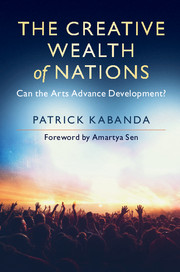Crossref Citations
This Book has been
cited by the following publications. This list is generated based on data provided by Crossref.
Sakr, Naomi
and
Steemers, Jeanette
2019.
Screen Media for Arab and European Children.
p.
73.
Ware, Vicki-Ann
and
Dunphy, Kim
2020.
How Do Arts Programmes Contribute in International Development? A Systematic Review of Outcomes and Associated Processes.
Progress in Development Studies,
Vol. 20,
Issue. 2,
p.
140.
Orttung, Robert W.
Anisimov, Oleg
Badina, Svetlana
Burns, Charlene
Cho, Leena
DiNapoli, Benjamin
Jull, Matthew
Shaiman, Melissa
Shapovalova, Ksenia
Silinsky, Leah
Zhang, Emily
and
Zhiltcova, Yelena
2021.
Measuring the sustainability of Russia’s Arctic cities.
Ambio,
Vol. 50,
Issue. 11,
p.
2090.
Lewis, David
Rodgers, Dennis
and
Woolcock, Michael
2021.
The Sounds of Development: Musical Representation as A(nother) Source of Development Knowledge.
The Journal of Development Studies,
Vol. 57,
Issue. 8,
p.
1397.
Moya‐Latorre, Antonio
2022.
URBAN CELEBRATION IN A BRAZILIAN FAVELA: From an Art Festival to a Youth Movement.
International Journal of Urban and Regional Research,
Vol. 46,
Issue. 6,
p.
1035.
Marjit, Sugata
and
Das, Gouranga
2023.
Managing Pandemic and Correcting Development Fundamentals.
p.
29.
Basu, Alaka M.
Basu, Kaushik
and
Tapia, Jose Maria U.
2023.
Managing Pandemic and Correcting Development Fundamentals.
p.
3.
Moya-Latorre, Antonio
2024.
Community weaving across Latin American peripheries: A listening infrastructure in Oaxaca.
Urban Studies,
Vol. 61,
Issue. 12,
p.
2416.
Snowball, Jeanette D.
and
Haines, Richard
2024.
The creative economy in Africa: The focus and scope of the African Journal of Creative Economy.
African Journal of Creative Economy,
Vol. 1,
Issue. 1,
MARJIT, SUGATA
and
DAS, GOURANGA G.
2024.
CONTACT-INTENSITY, DISRUPTIONS IN THE CULTURAL SECTOR AND WAGE INEQUALITY: A MODEL OF COVID-19 CRISIS AND ITS IMPACT.
The Singapore Economic Review,
Vol. 69,
Issue. 05,
p.
1717.
Gibson, Sarah-Jane
2024.
Teaching Music Performance in Higher Education.
p.
271.
Chen, Hao
Xu, Yaying
Agba Tackie, Evelyn
and
Ahakwa, Isaac
2024.
Assessing the Impact of Asset-Based Community Development Approach on Rural Poverty Alleviation in Ghana: The Moderating Role of Government Policies.
Sage Open,
Vol. 14,
Issue. 1,
Infanti, Jennifer J.
Omija Korpela, Jessica
Stephenson, Chloe Maria
Blystad, Astrid
Sørensen, Jane Brandt
Einarsdóttir, Jónína
Gebremariam, Mekdes Kebede
Gunnlaugsson, Geir
Herder, Tobias
Koivusalo, Meri
Löve, Jesper
Lundin, Karima
Perkiö, Mikko
Puthoopparambil, Soorej Jose
Sahlen, Klas-Göran
Haaland, Marte Emilie Sandvik
Stoor, Jon Petter
and
Atkins, Salla
2025.
Student experiences and perspectives on decolonising global health education: a qualitative study across five Nordic countries.
Global Health Action,
Vol. 18,
Issue. 1,



